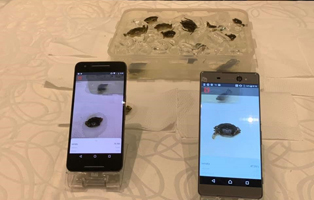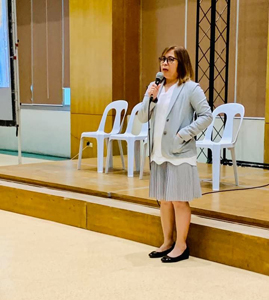 Crabifier, a mobile app that identifies mangrove crab species at the juvenile stage, was recently launched.
Crabifier, a mobile app that identifies mangrove crab species at the juvenile stage, was recently launched.
This mobile application was developed by the Technologies for Biodiversity Use and Conservation (TechBiodive) Unit of the De La Salle University (DLSU).
It is an output of the mangrove crab project, Integrating Genomics with Image Analysis and Geographic Information System Technology (GIS) for Improved Rearing of Mudcrabs funded by the Philippine Council for Agriculture, Aquatic and Natural Resources Research and Development of the Department of Science and Technology (DOST-PCAARRD).
Crabifier is an open-access mobile application for sorting the fast-growing market-preferred “king crab” and two other species of mangrove crabs, at the juvenile stages. It aims to help farmers maximize production in farms, reduce postharvest losses of juveniles, and potentially increase income by classifying the price of the mangrove juvenile crabs caught from the wild. This would help the mangrove crab industry especially that 80-90% still depend on wild-caught juveniles from mangroves.
The mobile app was developed by integrating data from DNA markers, data with image analysis, and mobile computing through partnership with the Practical Genomics Lab (PGL).
Headed by Dr. Ma. Carmen Ablan-Lagman and Dr. Chona Camille Vince Cruz-Abeledo of DLSU, the team that developed the app includes Southeast Asian Fisheries Development Center (SEAFDEC) experts Dr. Ma. Rowena Eguia, Ms. Ann Francesca Laguna, and Ms. Courtney Anne Ngo.
The launch, which was held at the Multipurpose Hall, Bro. Andrew Gonzales, FCS Hall, DLSU on July 8, 2019, also launched another app, Biodivesity and Threats Monitoring App or BioMon.
BioMon is an open-source mobile app for monitoring biodiversity and recording encounter data of terrestrial biodiversity.
 The data may be immediately downloaded to computers, bypassing the tedious process of encoding data, preventing data pile-up and encouraging immediate use of the data, especially for policy. The information may be stored, shared, and analyzed to draw maps for biodiversity distribution, evaluate threats, and establish relevant spatial and temporal patterns.
The data may be immediately downloaded to computers, bypassing the tedious process of encoding data, preventing data pile-up and encouraging immediate use of the data, especially for policy. The information may be stored, shared, and analyzed to draw maps for biodiversity distribution, evaluate threats, and establish relevant spatial and temporal patterns.
BioMOn will allow local communities to actively monitor their own key biodiversity areas, as well as obtain and use crowdsourced data. The technology was developed through a partnership between the Terestrial Ecology and Climate Resilience Lab (TECResilience) headed by Dr. Neil Aldrin Mallari of DLSU and the Center for Conservation Innovation Ph, Inc. (CCI).
Representing PCAARRD during the launch were Inland Aquatic Resources Research Division’s Officer-in-Charge Engr. Eduardo V. Manalili and Dr. Adelaida T. Calpe, Senior Science Research Specialist and Industry Strategic S&T Program (ISP) Manager for mangrove crab.
